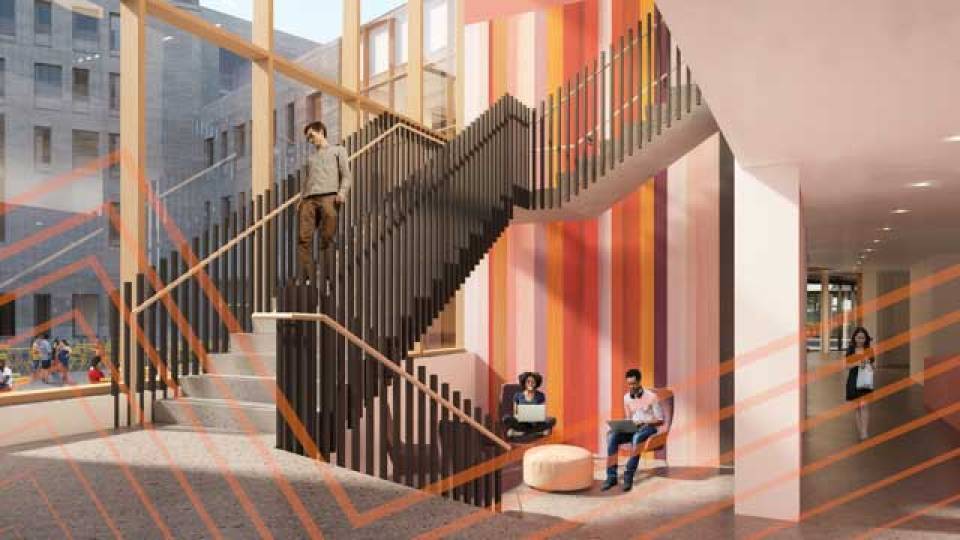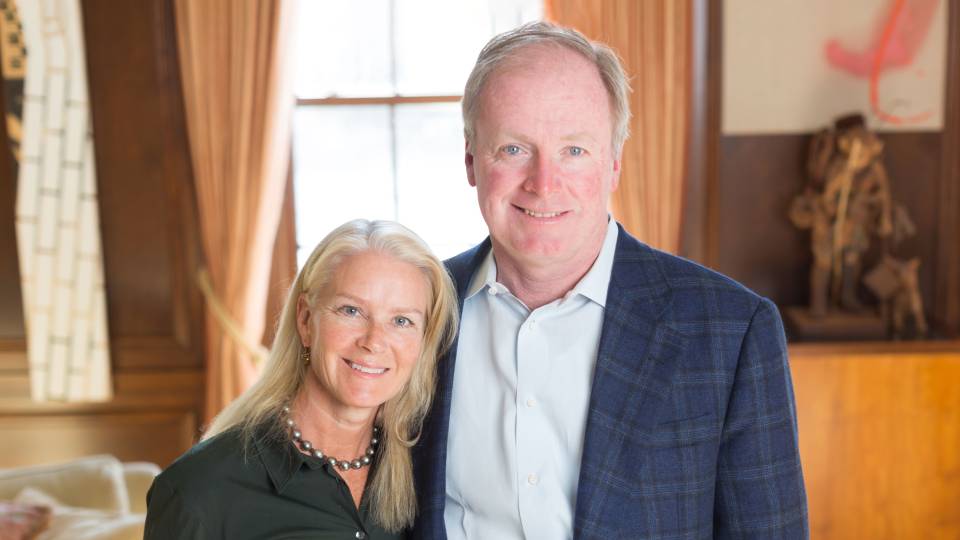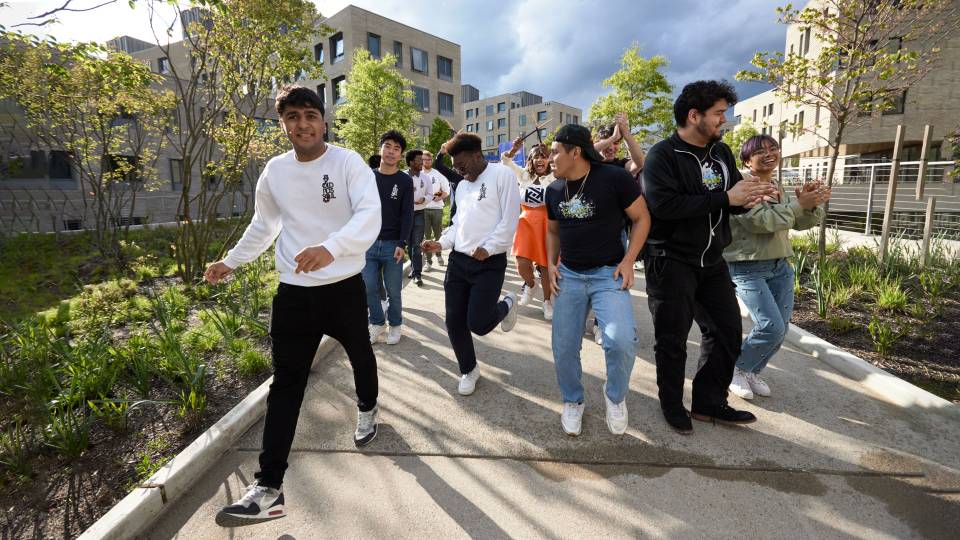Margaret and Dr. Robert Hariri have made a major gift to the Venture Forward campaign to support undergraduate student expansion at Princeton University. Hariri Hall, a new dormitory in Yeh College, will welcome students in the fall of 2022.
“Maggie and Bob Hariri have embraced Princeton’s mission-driven focus on expanding opportunities to students from every socioeconomic background,” said President Christopher L. Eisgruber ’83. “We are deeply grateful for their leadership and its impact on the generations of Princeton students who will call Hariri Hall home.”

Margaret and Dr. Robert Hariri made a major gift to the University that will name a new dormitory in Yeh College, opening this fall. All three of their children attend or graduated from Princeton.
In August, Princeton will open its first new student housing since 2007. Yeh College will become Princeton’s seventh residential college, and the adjacent New College West will become the new home for students and staff from the former First College. Situated along Elm Drive near Poe Field, the new residences will house approximately 500 students, enabling the University to expand the undergraduate student body by 10 percent so that additional high-achieving students will realize the benefits of a Princeton education, enhance the diversity and vitality of the campus community and contribute to society after their graduations.
“Education is the great equalizer, and one of the things that always impressed us about Princeton is how the University focuses on using its campus environment to foster tremendously close relationships between the students,” said Dr. Hariri. “The faculty and people of Princeton are so generous with their time and their intellect, and so deeply committed to the University, that they help perpetuate this Princeton community that lasts the students’ whole lifetimes.”
“It’s a thrill to be able to make this gift so that others like us — with working-class backgrounds — might be able to attend Princeton,” said Margaret Hariri. “We are fortunate to be able to support expanding the opportunities of a Princeton education so that students from a variety of backgrounds can pursue their dreams and proudly wear those beautiful Princeton colors throughout their lives.”
The residential colleges have shaped Princeton’s campus life since the current system was instituted in the early 1980s, and the close-knit community of colleges — which currently include Butler, First, Forbes, Mathey, Rockefeller and Whitman — remain essential to Princeton’s mission and distinctive educational model. The colleges integrate campus dining, social and academic life, and are designed as “centers not only for living but for learning,” providing collegial and collaborative learning environments that are integral to student development and support an inclusive campus community.
Once Yeh College and New College West open in the fall, the University will close First College, which dates back to 1968, and begin to build Princeton’s eighth residential college, Hobson College, in its place. Yeh College and New College West will share some important features, such as dining areas and common spaces. Their location extends the University’s residential district southward to a point where the more formal landscapes of the central campus lead into the natural landscapes of Lake Carnegie. The proximity to other residential colleges — Butler, First and Whitman — and the recreational open space on Poe and Pardee fields will support interaction, engagement and a strong sense of community. Deborah Berke Partners, an architecture firm known for inventive and enduring buildings and spaces that enable community engagement, designed the new residential colleges.
“The residential college system is the cornerstone of student life at Princeton, and the construction of new dormitories is essential to the preservation and extension of the University’s dynamic undergraduate experience,” said Jill Dolan, dean of the college. “We are grateful to Maggie and Bob Hariri for their resolute support of Princeton’s future, and we are proud to welcome students to Hariri Hall.”
Robert Hariri is the chairperson, founder and chief executive officer of Celularity, Inc., a leading human cellular therapeutics company. He is a pioneer in the use of stem cells to treat life-threatening diseases and has made transformative contributions in the field of tissue engineering. From 1987-1994, Hariri served as co-founder, vice chair and chief scientific officer of Neurodynamics, a neurosurgical medical device company. He founded Anthrogenesis Corporation, a biopharmaceutical company focused on human stem cell therapeutics and regenerative medicine, in 1998, and served as CEO of Celgene Cellular Therapeutics after Anthrogenesis was acquired by Celgene Corporation. He also co-founded Human Longevity, a genomic-based health intelligence company that combines DNA sequencing and expert analysis with machine learning. Hariri received his M.D., Ph.D. from Weill Cornell Medical College, where he is an adjunct professor of neurological surgery.
Margaret Hariri is a former special-education teacher who switched gears to do marketing and regulatory affairs alongside Robert at Neurodynamics and currently manages several of the Hariri family businesses. She has played a leading role as a trustee, board member or campaign vice chair for several organizations, including Liberty Science Center, Overlook Medical Center and BlinkNow, a nonprofit foundation dedicated to empowering youth in Nepal.
The Hariri Family Foundation has made numerous philanthropic gifts to support scientific and health research, education, the arts and community service organizations, including the American Leukemia and Lymphoma Society, the ALS/TDF Foundation, the National Multiple Sclerosis Foundation, the Roundabout Theater, and the Intrepid Historical Foundation. The Hariris have established two professorships at Dr. Hariri’s alma maters: Columbia University and Weill Cornell Medicine.
The Venture Forward campaign is a mission-driven campaign that is focused on Princeton University’s strengths in the liberal arts, pushing the bounds of knowledge across disciplines, and collaborating to champion inclusion, the humanities, science, art, public policy and technology. The campaign has three areas of impact: deepening engagement of Princeton’s alumni community; providing a platform to communicate Princeton’s service to humanity and its vision for the future; and securing philanthropic support for the University’s strategic initiatives.






